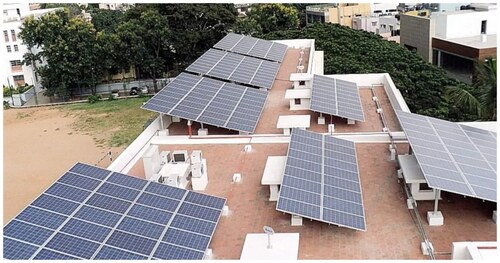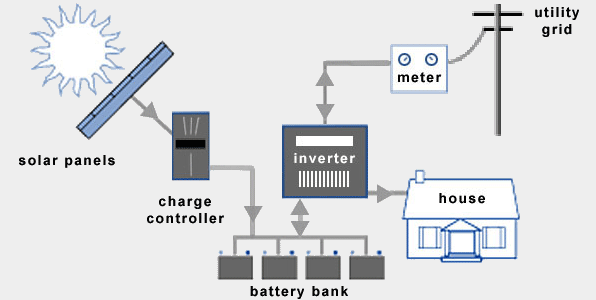Investing in solar power isn’t just a financial decision; it’s a decision for a brighter, more independent future. When you switch to solar, you’re not just cutting down on your electricity bill; you’re taking control, ensuring power during outages, and giving a nod to Mother Earth.
But let’s be honest, standing on your roof and looking at a panel is a bit like looking at a foreign language. How do you choose the right one for your home in India’s unique and varied climate?
Think of your solar panel as a tireless, 25-year workhorse that’s going to stand up to the scorching summers, heavy monsoons, and everything in between. You need efficiency, durability, and the peace of mind that comes from a solid warranty.
We’ve done the homework for you and broken down the top players in the Indian residential solar market for 2024–2025. These are the brands that consistently deliver on efficiency, trust, and performance.
10 Best Solar Panels for the Indian Home
The landscape is dominated by high-efficiency Mono PERC and newer N-Type TOPCon modules. Here are the top manufacturers and their standout residential offerings:
Ready to take that leap for your home or office? In this post, we’ll introduce you to the unsung heroes of this revolution: The 10 Best Solar Panels for Your Indian Home.
| Rank | Manufacturer | Highlighted Series/Model (Technology) | Why Homeowners Love It |
| 1 | Adani Solar | ADN Series (Mono PERC) | Integrated Trust: Part of a massive Indian conglomerate, offering a sense of stability and commitment to large-scale, high-efficiency manufacturing. |
| 2 | Tata Power Solar | TP Series (Mono PERC) | The Old Guard: Decades of brand trust in India. Known for durable products and a strong nation-wide service network, perfect for peace of mind. |
| 3 | Waaree Energies | Arka Series (Monocrystalline/Mono PERC) | The Performance King: One of India’s largest manufacturers, often praised for panels engineered for harsh Indian environments like coastal areas (anti-PID, anti-salt mist). |
| 4 | Loom Solar | Shark Series (Mono PERC Half-Cut) | The Rooftop Specialist: Popular among homeowners with limited space. Their Shark series offers exceptional performance in low-light and cloudy conditions. |
| 5 | Vikram Solar | Somera Grand Ultima (Monocrystalline) | Engineering Excellence: Known for rigorous testing and high-quality, export-grade modules that offer consistent output even in high temperatures. |
| 6 | RenewSys | DESERV Galactic (Mono PERC) | Vertical Integration: As an integrated manufacturer of cells and modules, they maintain better quality control and competitive pricing. A reliable ‘Made in India’ choice. |
| 7 | Goldi Green | Goldi Prime (Mono PERC) | Affordability & Quality: Rapidly growing brand known for delivering high-quality, reliable modules at a very competitive price point, offering great value for money. |
| 8 | IB Solar | Valor Series (Mono PERC Half-Cut) | Shade Resistant: Excellent half-cut cell technology that improves power output, especially if your roof has partial shading at certain times of the day. |
| 9 | Luminous | Solar NXG (Mono PERC) | Ecosystem Advantage: Ideal if you’re planning a complete Luminous solar setup (inverter, battery, and panel) for seamless system integration and service. |
| 10 | Havells | Enviro Series (Mono PERC) | Trusted Electrical Brand: Leverages its vast and established service and distribution network in India, making after-sales support very accessible. |
For Indian residents, solar panels offer a powerful opportunity to significantly reduce electricity bills, often resulting in a credit or negative balance where the utility company actually owes you money. This incredible savings potential is greatly enhanced by government subsidies and the ability to generate more electricity units than your household consumes. However, a homeowner must remain aware of certain challenges before committing to an installation.
One common issue is that the actual power performance may not always meet the installer’s initial projections. Additionally, while the panels themselves carry lengthy performance warranties, the crucial electronic component, the inverter, typically comes with a much shorter warranty, usually lasting only five to ten years.
Furthermore, buyers must exercise extreme caution to avoid the growing market problem of fake panels, which often feature poor-quality protective coatings or internally damaged cells.
Despite these potential pitfalls, the overall advantages of drastically reduced electricity costs, long-term protection against ever-rising power tariffs, and the provision of steady power during brownouts are truly compelling.
To ensure a successful and long-lasting investment, it is absolutely crucial to carefully vet installers, thoroughly read all contracts, and perform diligent quality checks on the physical equipment before the installation is finalized.

What Matters Most to YOU: A Human Guide to Buying Solar
Buying solar power for your home doesn’t have to feel like navigating a maze of technical terms and high-pressure sales. At its core, this guide is about making an informed decision that suits your specific needs and budget, focusing on energy savings and environmental impact.
Start by understanding your current electricity usage, getting at least three different quotes from reputable local installers, and prioritizing system performance and long-term warranties over the lowest sticker price. Remember, the best solar system is one that is properly sized, reliably installed, and gives you peace of mind for decades to come.
Forget the technical jargon for a minute. Your decision comes down to three human factors: Space, Climate, and Trust.
-
The Space Factor: Efficiency vs. Cost
- Limited Roof Space (Urban Homes): If you have a small rooftop in a city apartment or bungalow, you need the most power from the smallest area.
- Choose: Mono PERC Half-Cut (e.g., Loom Solar Shark, IB Solar Valor). These are the most efficient () and cost a little more, but they maximize your energy yield in a small footprint.
- Plenty of Space (Rural or Large Homes): If you have a large, shade-free roof, you have flexibility.
- Choose: While Mono PERC is still the gold standard, you can also consider Polycrystalline panels (less efficient, lower cost per watt) if budget is a severe constraint, though most premium brands are moving away from this technology.
-
The Climate Factor: Heat and Durability
India is hot! Heat reduces a panel’s efficiency.
- Look for: Panels from brands like Waaree and Vikram Solar. They specifically engineer their modules for harsh environments and offer excellent Temperature Coefficient ratings (lower is better, as it means less efficiency loss in the heat).
- Coastal Areas: Look for Anti-Salt Mist Corrosion Certification in the panel’s specifications.
-
The Trust Factor: Warranty and Service
A 25-year performance warranty means nothing if the company disappears in 10 years.
- Product Warranty (10-12 Years): Covers manufacturing defects.
- Performance Warranty (25 Years): Guarantees that the panel will still produce at least 80% of its original rated output after 25 years.
The Human Angle: Choose a company with a strong, visible presence and a reputation for stability, like Tata Power Solar or Adani Solar. A Tier-1 manufacturer status (as recognized by BloombergNEF) is a great indicator of a company’s financial stability and ability to honor long-term warranties.

Your Next Step toward Solar?
Selecting a solar panel is the beginning of your energy independence journey. But remember, the panel is only one part of the system. The quality of your inverter and the expertise of your installer are just as crucial.
Why 2026 is Your Year to Go Solar in India : The Power of the Sun
Imagine a future where your home’s air conditioner runs all summer without giving you a panic attack over the electricity bill. That future isn’t a dream, it’s here, and it’s powered by the sun.
India is standing on the brink of an energy revolution, and in 2026, we will be lighting up the world by becoming a massive solar power generator. With the government strongly backing this shift, there’s never been a better time to be part of this historic change.
This isn’t just about reducing a carbon footprint; it’s about gaining real freedom. Freedom from high tariffs, freedom from power cuts, and the freedom of knowing you generate your own clean energy.
We’ve sifted through the market giants and the rooftop specialists from trusted Indian names like Loom Solar, Vikram Solar, Luminous, Microtek, and Havells, to global players like REC Solar—to help you find the perfect, long-lasting partner for your roof.
The Two Ways to Go Solar: Grid-Tied vs. Power Backup

When you put panels on your roof, the power they generate can be used in one of two fundamental ways. Think of it as either working with the electricity company or breaking up with them completely.
-
On-Grid Solar System: The Smart Exchange (Best for Urban Homes)
This is the most popular choice for city and urban homes where power cuts are minimal or manageable.
- How it works: Your solar system is directly connected to the local electricity grid. Instead of storing your extra solar power, you send it straight back to the grid. Your electricity meter literally runs backward!
- The Benefit: This is called Net Metering. Your monthly bill only reflects the net amount of electricity: the power you used from the grid minus the surplus power your panels sent back. It’s a genius system for maximizing savings.
- The Catch: This is the important part: If the main power grid goes down, your solar system shuts off too. This safety feature (called “anti-islanding”) prevents your panels from sending electricity down lines that utility workers might be fixing. So, while it saves you money, it won’t keep your lights on during a government-mandated power cut.
-
Off-Grid Solar System: Your Own Private Powerhouse (Best for Backup)
This system is built for complete energy independence and to defeat those dreaded frequent power cuts.
- How it works: Your solar energy doesn’t go to the public grid; it is first stored in a bank of deep-cycle batteries. When you need power (day or night, grid on or off), the batteries supply it to your home.
- The Benefit: Total peace of mind during blackouts. Because you are disconnected from the main grid, your home continues to run on battery power. This is why demand is high in rural areas, or even in urban pockets with notoriously unreliable supply. It ensures a regular, stable source of energy.
- The Catch: Batteries add significant upfront cost and require more maintenance than a grid-tied system. You are also limited by how much energy your battery bank can store.
Final Thoughts on Solar panels for Home
In conclusion, we have seen the top 10 best solar panels for home in India. To check price and order online for your home, residential and Industrial use contacts us SolarEarth. We are solar company in Gujarat, India with authorized dealership and suppliers of solar panels.
FAQs on Best Solar Panels for Home in India
-
What are the best types of solar panels for home use in India?
The most commonly recommended solar panels for homes in India are Monocrystalline and Polycrystalline panels.
- Monocrystalline panels are more efficient and ideal for limited rooftop space.
- Polycrystalline panels are cost-effective with slightly lower efficiency.
There’s also PERC, Bifacial, and Half-cut cell solar panels that offer improved performance.
-
How much roof space do I need for a solar system?
A typical 1 kW solar system requires approximately 80–100 sq. ft. of unobstructed roof area. The space requirement increases proportionally with system size.
-
What is the ideal efficiency for solar panels in India?
Good residential solar panels typically range from 18% to 22% efficiency.
Higher efficiency panels generate more power per sq. ft., which is valuable if roof space is limited.
-
Do solar panels work during cloudy or rainy days?
Yes of course, solar panels still generate electricity even on cloudy days, though output is reduced. India’s monsoon regions still produce significant solar power due to diffused sunlight.
-
What warranties should I look for in solar panels?
Two main warranties to check: Product Warranty – Usually 10–12 years (covers physical defects). & Performance Warranty – Typically 25 years (panels should still produce ~80–90% output by year 25).
-
Are there government incentives for solar installations in India?
Yes, the Indian government and many state governments offer: Subsidies on rooftop solar systems, Net metering benefits, Low-interest loans or incentives Programs and amounts vary by state and utility provider.
-
How much electricity can a 1 kW solar system produce in India?
In most Indian cities, 1 kW systems generate ~4–5 units/day on average, depending on location, shading, and system orientation.
-
How long do solar panels last?
Quality solar panels typically last 25–30 years, with gradual degradation over time.
-
Can I expand my solar system later?
Yes for sure, as long as your roof and inverter capacity allow, you can add more panels to increase system size.



